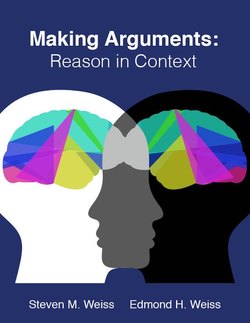Читать книгу Making Arguments: Reason in Context - Edmond H. Weiss - Страница 28
На сайте Литреса книга снята с продажи.
Responsibility VII—Behavior
ОглавлениеAll the responsibilities presented this far all lead to a final set of responsibilities that cluster under the heading of behavior: namely, how arguers ought to act, the things arguers ought to do as they argue and present cases.
•Arguers need to ask questions and follow up on the answers they receive. Part of argumentation is the process of silent inquiry. For arguments to extend, develop, and be resolved, all relevant information for judgment must be ascertained and evaluated.
•Arguers should be able to crystallize their arguments. By the end of a dispute, debate, trial, or deliberation, an advocate should be able to define clearly all the key issues and arguments that he or she wants to have the decision-maker examine in rendering judgment.
•Arguers must enlarge the scope of argumentation as a controversy progresses. Argument is vital, alive, dynamic, and fluid. The arguers respond by keeping the argument alive, keeping it growing, and feeding it. They offer new evidence, new arguments, new lines of reasoning. They are creative and adaptive to the demands of the unfolding argument.
•Arguers recognize their role in the debate. They are always mindful of their responsibilities. An arguer asks, “What do I need to be doing now? What do I need to learn so as to advance my side of the case?” On the affirmative side of the case, an advocate needs to ask: “Am I meeting my burden of proof? Have I presented a prima facie case for change, and am I continuing to uphold my burden?” On the negative side the advocate needs to find out if he or she is exploiting the power of presumption, and the inherent flexibility that exists within it.
•Arguers must improvise and adapt to the situation. Argument can be a bit of a dance, but the steps are not choreographed. At some junctures in an argument, advocates can go in an entirely unplanned direction. So long as parties to one’s position are on board with these adaptations, they can be effective alterations to argumentative strategy with often astonishing results. Indeed, sticking stubbornly to a rigid argumentative road map may severely hamper one’s advocacy.
•Arguers exhibit intellectual humility. They know when an argument is not succeeding, and when to jettison it. A strong argument can be salvaged by relinquishing a weak one that is along for the ride, but which is not helping the overall cause of the argument. Realistic expectations help an arguer decide what arguments to jettison, and which to strengthen.
•Arguers don’t seek perfection. Argumentation operates in the area of the contingent, embracing uncertainty at every turn. There is no perfect argument, no slam-dunk case that proves something with mathematical certainty. Argument is about probabilities, likelihoods, and controversial courses of action.
All these responsibilities demand the ability to listen carefully to what everyone else is saying and, when appropriate, respond or adapt. Although listening is hard to do, especially when one is under pressure and planning what to say next, it is the only way to keep the argument moving forward and expanding. And it is the only way to win.
